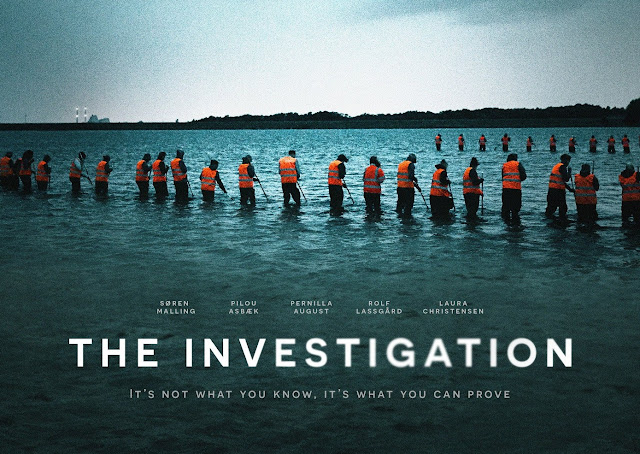Drama and Compassion - 'The Investigation'
"If in the first act you have hung a pistol on the wall, then in the following one it should be fired. Otherwise, don't put it in there." Anton Chekhov
*
In the second episode of The Investigation we find Jens Moller, the Head of Danish Homicide, taking his shotguns out of a cabinet and giving them a thorough clean. In almost any other crime drama, this action would be accompanied by a sense of foreboding and a certainty that someone - rather than the occasional hapless duck - was going to get blown away. Indeed, Chekhov would have demanded that this should happen. Not so with Tobias Lindholm's series. Based upon the real life 2017 murder of Kim Wall by a seedy inventor in his homemade submarine, The Investigation is very different. It does not show or even mention the murderer by name, instead focusing a compassionate attention on both the ordeal that Wall's mother and father are put through, and the desperate search for Kim's body that will provide the evidence and proof to convict.
The drama is unusual in that it is almost without character arcs. Strengths and flaws are apparent in all of the investigators, but they are the qualities that you'd find in any workplace. Musa takes too long on his lunch-break and is occasionally hard to find; Maibritt works long hours and beats herself up about minor mistakes (spilling coffee all over her files) and slightly more serious mistakes (leaving those files in a public place); Nikolaj can occasionally seem ineffective and uninterested, but will suddenly come up with a great bit of work (I love how for half of the series there's barely a word on his investigative whiteboard). Again, in any other drama these traits would signal an incoming catastrophe or some major plot twist. Not here though. This is a story about the real world, and though we are calibrated to sense portentousness in drama, we rarely see it realised. These people are ordinary: good people doing their best in difficult and sometimes horrific circumstances and occasionally making mistakes. As if to drive this home, we even get a glimpse of the famous Øresund Bridge and you think back to another Danish-Swedish drama. Here, though, the bridge is just a bridge and not an extended metaphor.
Even the unnamed and unseen perpetrator of the murder is unremarkable. Almost all crimes are not committed by evil geniuses. Even if, like this one, they have the wherewithal to build an homemade submarine, there's still a sordid banality to them. They'll always make mistakes and will greatly overestimate their abilities.
Perhaps all of this makes The Investigation sound a bit dull. Far from it. It's gripping television that centres around the Latin legal phrase 'in dubio pro reo' (roughly translated as 'where there is any reasonable doubt it should always benefit the accused'). The public prosecutor - played by Pilou Asbæk, more familiar for his role as Euron Greyjoy in Game of Thrones and looking slightly annoyed that he doesn't get to reprise any of his Westeros antics - is tasked with keeping the investigative team focused on this legal principle, and therein lies the main dramatic thread.
Finally, what lifts The Investigation up into the echelons of great television is its compassion. That it was made with the approval and cooperation of Kim Wall's parents is telling (in fact Joachim and Ingrid Wall were integral to the 2017 investigation). As Ingrid remarked: "We had to do it. Otherwise we'd have fallen down this big black pit and never come back to life again. This was the only way to survive, to make something good out of it." The drama captures the essence of the couple's bravery, a willingness to look directly at the most horrific of circumstances and reclaim them from the murderer. This makes for an often difficult but ultimately empathetic viewing experience. And whilst it may not have the fireworks and twists and turns of many other dramas, because of the great care that it takes with its subject, it will linger far longer in the memory.



Comments
Post a Comment